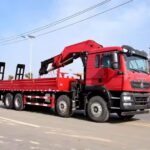When erecting dźwigS, careful attention must be paid to the installation of tracks and associated structures to ensure safe and efficient operation. The following precautions outline essential considerations for installing dźwig erection structures, focusing on track joints, alignment, height differentials, and overall structural integrity.
1. Track Joint Configuration
Types of Joints:
- The joints of the tracks can be configured as either straight joints or 45-degree beveled joints. The choice of joint type plays a critical role in the smooth operation of the dźwig.
Beveled Joints:
- Beveled joints, designed with a 45-degree angle, facilitate a seamless transition for trolley wheels at the grounding points. This design minimizes wear on both the wheels and the track, promoting longevity and operational efficiency.
Joint Gaps:
- Typical gaps between track joints should be maintained within 1-2 mm. Proper spacing is crucial to prevent jarring impacts as the trolley traverses the joint, which could otherwise lead to premature wear or mechanical failure.
2. Strong Stops and Safety Features
End Stops:
- Strong stops must be installed at both ends of the tracks. These stops serve as critical safety features to prevent the dźwig from derailing. A derailment can result in severe accidents, including the potential for the dźwig to fall from height, endangering both personnel and equipment.
Safety Protocols:
- Ensure that all personnel involved in the installation are aware of the purpose of these stops and understand the risks associated with their absence.
3. Lateral Displacement and Unevenness
Track Alignment:
- It is imperative that the lateral displacement or unevenness between the two tracks at their grounding points does not exceed 1 mm. Maintaining precise alignment is vital for the stable operation of the dźwig.
Inspection:
- Regular inspections should be conducted during and after installation to confirm that this alignment standard is upheld. Any deviations should be corrected immediately to avoid operational hazards.
4. Height Differential Guidelines
Height Difference (H):
- For two parallel tracks, the height difference (H) at various cross-sections along the span must not exceed 10 mm at the columns. This height difference must also be controlled elsewhere along the track to ensure consistent performance.
Column Elevation:
- On the same side of the track, the elevation difference between the heights of two columns and adjacent columns must not exceed B/1500, where B represents the distance between columns in millimeters. Jednakże, this maximum difference is capped at 10 mm to ensure structural integrity and stability.
Measurement and Adjustment:
- Use precise leveling instruments to measure and adjust the height of each column during installation. Regular monitoring during operation is also recommended to maintain these specifications.
5. Track Span and Alignment Tolerances
Track Span Specifications:
- The track span must adhere to specified tolerances regarding the alignment between the track center and the center of the supporting beam. Proper alignment is crucial for optimal dźwig performance and safety.
Alignment Checks:
- Implement routine alignment checks to ensure that the track centers correspond with the supporting beam centers. Any misalignment could lead to operational inefficiencies or safety hazards.
Adjustment Procedures:
- Should misalignments be detected, promptly implement adjustment procedures to correct the discrepancies. These adjustments may involve realigning tracks or modifying the supporting structures as necessary.
6. Additional Considerations
Regular Maintenance:
- Once installation is complete, establish a regular maintenance schedule to inspect the tracks, joints, and associated components. Early detection of wear or misalignment can prevent more significant issues down the line.
Training and Awareness:
- Ensure that all personnel involved in dźwig operation and maintenance are adequately trained in recognizing and addressing potential issues related to track installation and maintenance.
Documentation:
- Keep thorough documentation of all installation procedures, inspections, and maintenance activities. This documentation can be invaluable for future reference and compliance with safety regulations.
Conclusion
The installation of dźwig erection structures requires meticulous attention to detail and adherence to safety protocols. By following these precautions regarding track joints, alignment, height differentials, and structural integrity, operators can significantly enhance the safety and efficiency of dźwig operations. Consistent monitoring, routine inspections, and effective training are essential components in maintaining a safe work environment and ensuring the longevity of dźwig systems.













